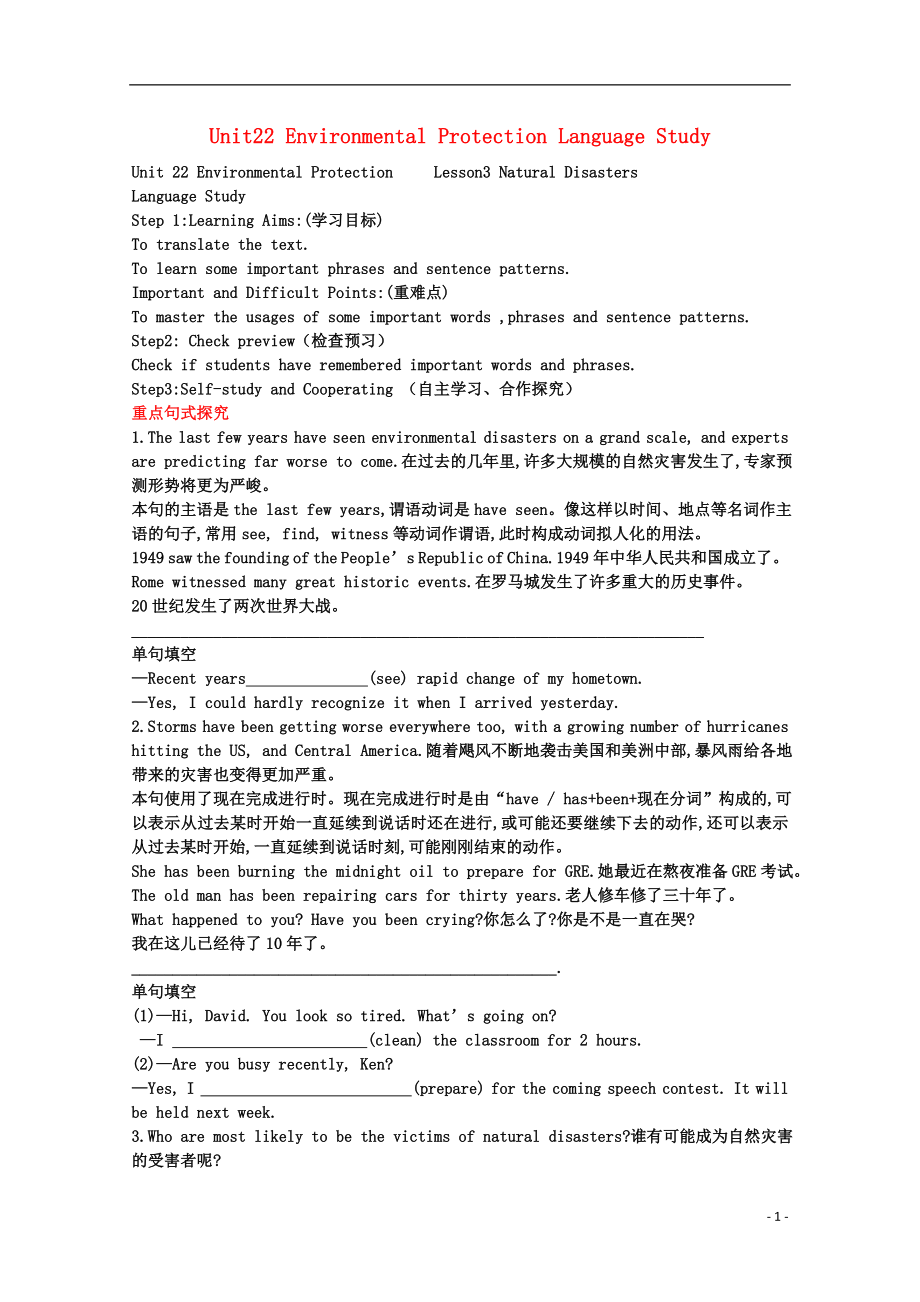《廣東省佛山市三水區(qū)華僑中學(xué)高中英語 Unit22 Environmental Protection Language Study導(dǎo)學(xué)案2 北師大版選修8》由會(huì)員分享����,可在線閱讀����,更多相關(guān)《廣東省佛山市三水區(qū)華僑中學(xué)高中英語 Unit22 Environmental Protection Language Study導(dǎo)學(xué)案2 北師大版選修8(3頁珍藏版)》請(qǐng)?jiān)谘b配圖網(wǎng)上搜索����。
1、
Unit22 Environmental Protection Language Study
Unit 22 Environmental Protection Lesson3 Natural Disasters
Language Study
Step 1:Learning Aims:(學(xué)習(xí)目標(biāo))
To translate the text.
To learn some important phrases and sentence patterns.
Important and Difficult Points:(重難點(diǎn))
To master the usages o
2����、f some important words ,phrases and sentence patterns.
Step2: Check preview(檢查預(yù)習(xí))
Check if students have remembered important words and phrases.
Step3:Self-study and Cooperating (自主學(xué)習(xí)、合作探究)
重點(diǎn)句式探究
1.The last few years have seen environmental disasters on a grand scale, and experts are predictin
3����、g far worse to come.在過去的幾年里,許多大規(guī)模的自然災(zāi)害發(fā)生了,專家預(yù)測(cè)形勢(shì)將更為嚴(yán)峻。
本句的主語是the last few years,謂語動(dòng)詞是have seen����。像這樣以時(shí)間、地點(diǎn)等名詞作主語的句子,常用see, find, witness等動(dòng)詞作謂語,此時(shí)構(gòu)成動(dòng)詞擬人化的用法����。
1949 saw the founding of the People’s Republic of China.1949年中華人民共和國成立了。
Rome witnessed many great historic events.在羅馬城發(fā)生了許多重大的歷史事件����。
20世紀(jì)發(fā)生了
4����、兩次世界大戰(zhàn)����。
______________________________________________________________________
單句填空
—Recent years (see) rapid change of my hometown.
—Yes, I could hardly recognize it when I arrived yesterday.
2.Storms have been getting worse everywhere too, with a growing number of hurricanes hittin
5、g the US, and Central America.隨著颶風(fēng)不斷地襲擊美國和美洲中部,暴風(fēng)雨給各地帶來的災(zāi)害也變得更加嚴(yán)重����。
本句使用了現(xiàn)在完成進(jìn)行時(shí)。現(xiàn)在完成進(jìn)行時(shí)是由“have / has+been+現(xiàn)在分詞”構(gòu)成的,可以表示從過去某時(shí)開始一直延續(xù)到說話時(shí)還在進(jìn)行,或可能還要繼續(xù)下去的動(dòng)作,還可以表示從過去某時(shí)開始,一直延續(xù)到說話時(shí)刻,可能剛剛結(jié)束的動(dòng)作����。
She has been burning the midnight oil to prepare for GRE.她最近在熬夜準(zhǔn)備GRE考試。
The old man has been repairing cars fo
6����、r thirty years.老人修車修了三十年了����。
What happened to you? Have you been crying?你怎么了?你是不是一直在哭?
我在這兒已經(jīng)待了10年了。
____________________________________________________.
單句填空
(1)—Hi, David. You look so tired. What’s going on?
—I (clean) the classroom for 2 hours.
(2)—Are you busy recen
7����、tly, Ken?
—Yes, I (prepare) for the coming speech contest. It will be held next week.
3.Who are most likely to be the victims of natural disasters?誰有可能成為自然災(zāi)害的受害者呢?
“be likely to do”為固定用法,意為“極有可能……”����。likely還可以用于句型“It is likely that...”句型中,意為“很可能……”,it為形式主語,代替that引導(dǎo)的主語從句,避免句
8����、子因頭重腳輕而失衡。
明天有可能要下雨����。(一句多譯)
_________________________________________________________________________________
probably, possibly, likely, perhaps和maybe的用法區(qū)別:
likely是常用詞,指從表面痕跡來看很有可能。主語既可以是人也可以是物����。可以說“sb / sth be likely to do”,但是不可以說“It is likely for sb to do”����。
possible強(qiáng)調(diào)客觀上有可能,但含有實(shí)際上可能性很小的意思。主語
9����、不可以是人,只能是用it 作形式主語。構(gòu)成“It is possible for sb to do sth”����。
probable 語氣比possible強(qiáng),常用來指有根據(jù)����、合乎情理����、值得相信的事,可能性最大,是most likely的意思,含有“很有可能;十有八九”的意思。其主語或所修飾詞只能是物,此外,該詞也不能用人作主語或構(gòu)成復(fù)合賓語����。表示“某人可能做某事”,只能用It is probable that sb...或It is probable for sb to do sth句型。perhaps 作“或許”解,有“也許如此,也許不如此”的意味����。
maybe也作“也許”解,同perh
10、aps意思接近,但比perhaps更為普通而又不那么莊重����。perhaps是英國英語,maybe是美國英語。
Ⅰ.同義句轉(zhuǎn)換
(1)It is likely that our group will win the first prize in the contest.
Our group win the first prize in the contest.?
(2)He was likely to fail in the exam because he was absent-minded.
It is
11����、 he failed in the exam because he was absent-minded. ?
Step5: Doing exercises(課堂檢測(cè))
Ⅱ.翻譯句子
1.那些士兵配有槍����。(arm)
2.大雨引起洪水����。(result in)
3.電話是一種通訊工具����。(means)
4.她含著眼淚說了聲再見。(with復(fù)合結(jié)構(gòu))
5.昨晚有一場(chǎng)激烈的比賽����。(see)
Step6: Summaryand homework(小結(jié)和作業(yè))
1.M
12、emorize words and phrases in lesson3 .
2. Review the text of Lesson3.
答案
合作探究
重點(diǎn)句式探究
1.The twentieth century saw two World Wars. have been
2.I have been living here for 10 years.(1) have been cleaning(2)have been preparing
3.It is likely to rain tomorrow.或It is likely that it will rain tomorrow.
Ⅰ.(1)is likely to (2)possible / probable / likely
課堂檢測(cè)
Ⅱ.
1.The soldiers were armed with guns.
2.Heavy rains resulted in floods.
3.The telephone is a means of communication.
4.She said good-bye with tears in her eyes.
5.Last night saw a fierce match.
- 3 -
 廣東省佛山市三水區(qū)華僑中學(xué)高中英語 Unit22 Environmental Protection Language Study導(dǎo)學(xué)案2 北師大版選修8
廣東省佛山市三水區(qū)華僑中學(xué)高中英語 Unit22 Environmental Protection Language Study導(dǎo)學(xué)案2 北師大版選修8

